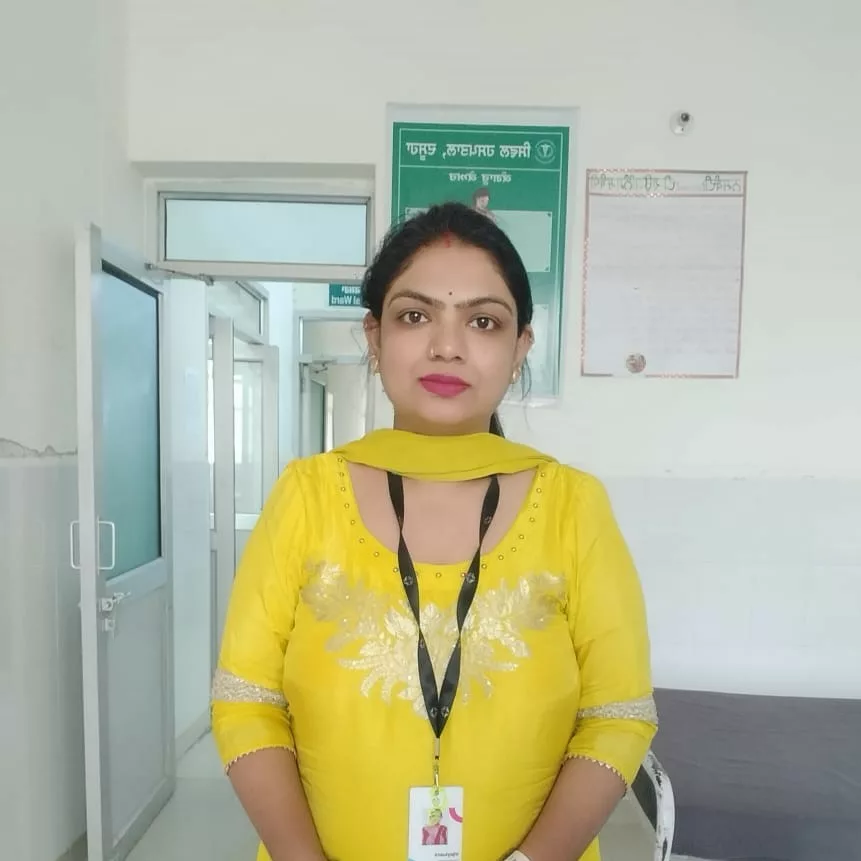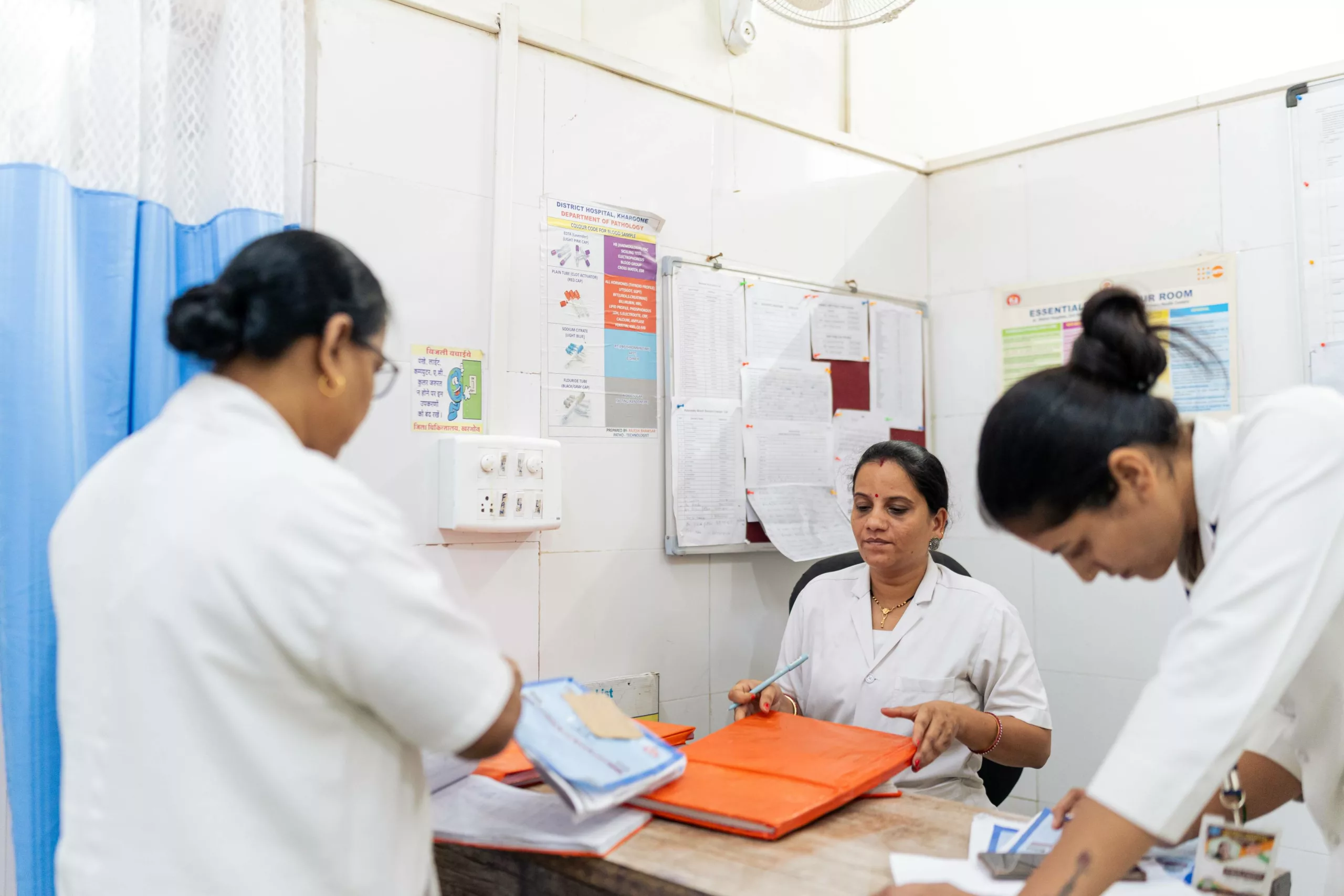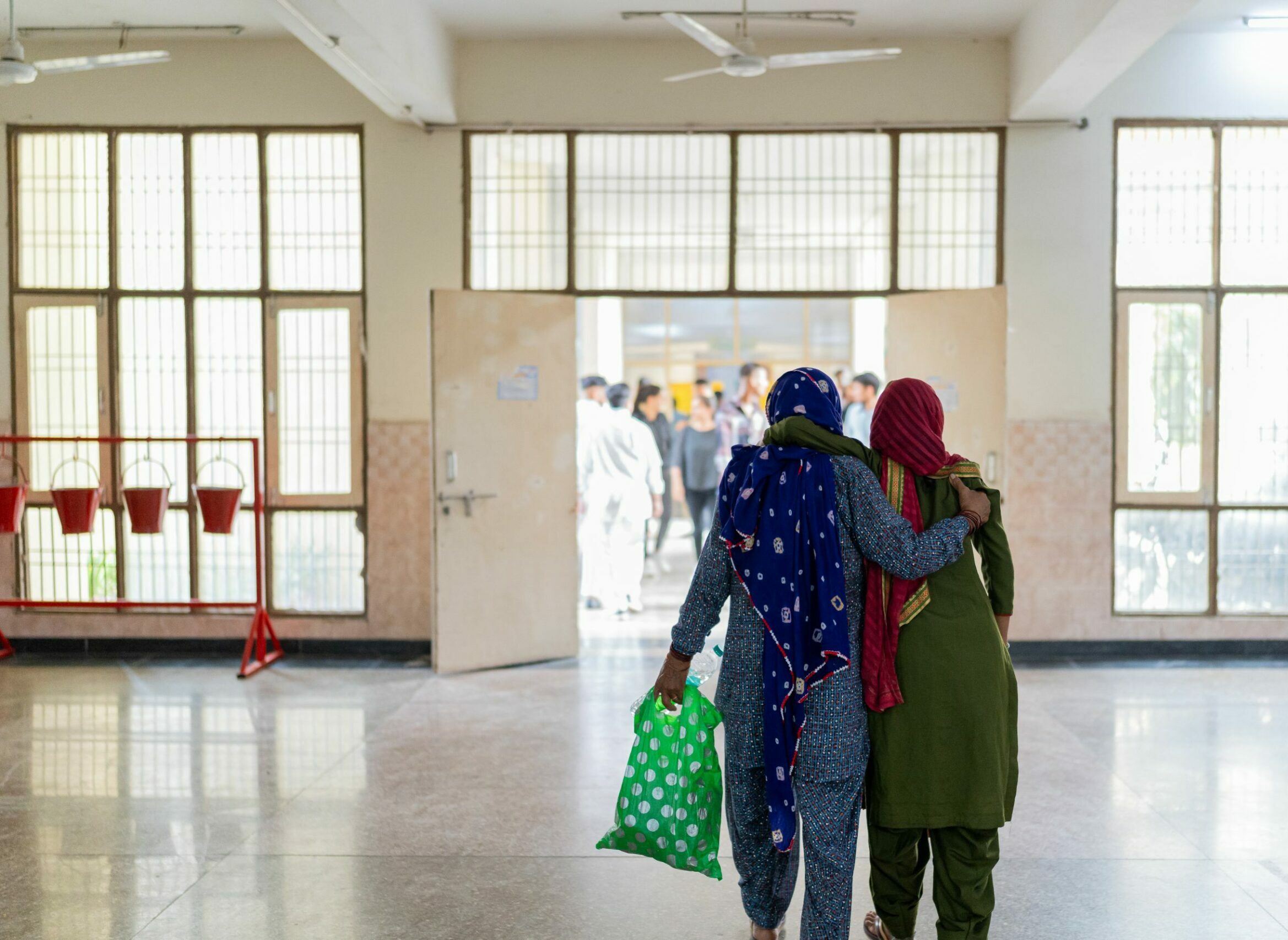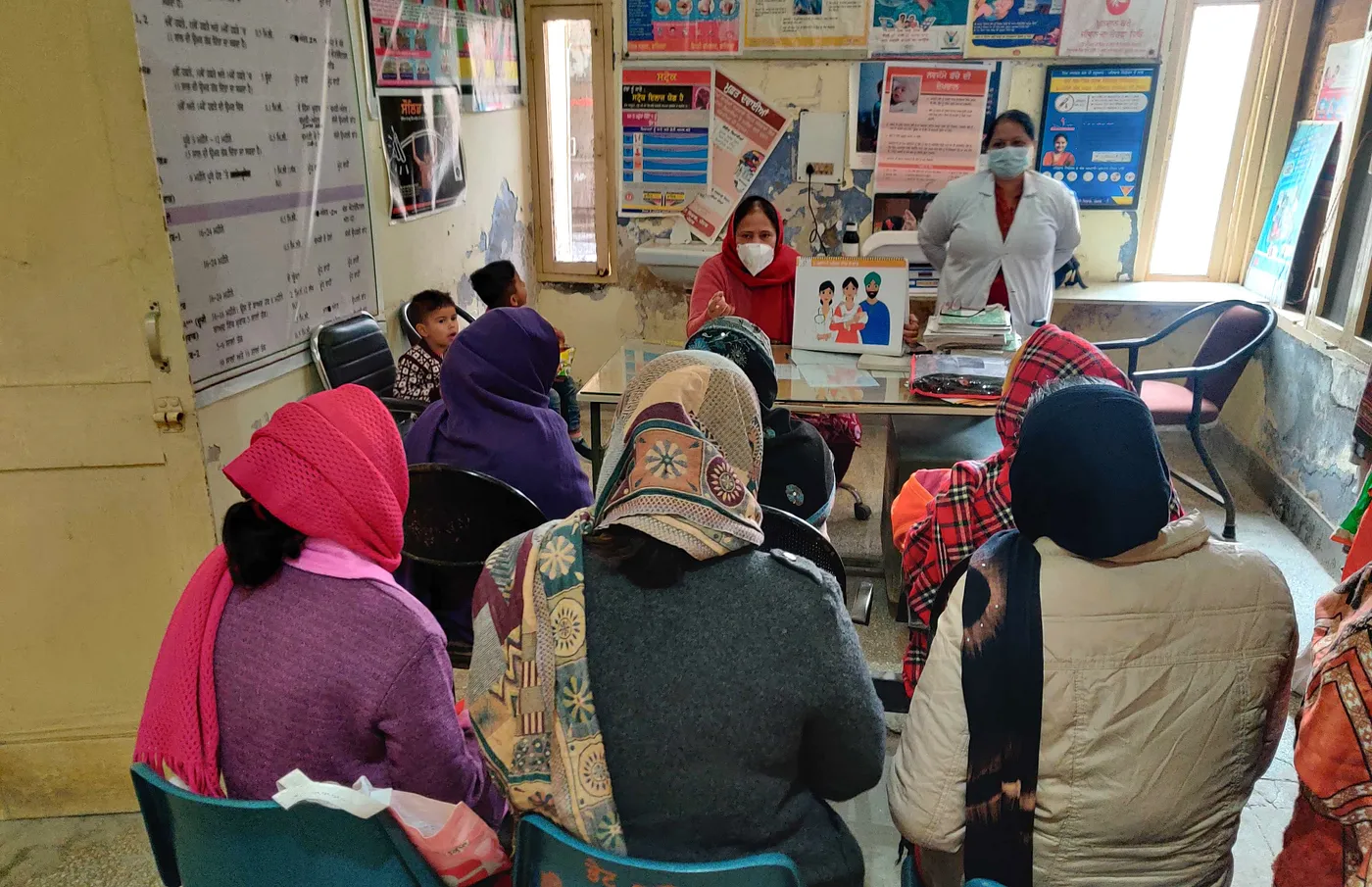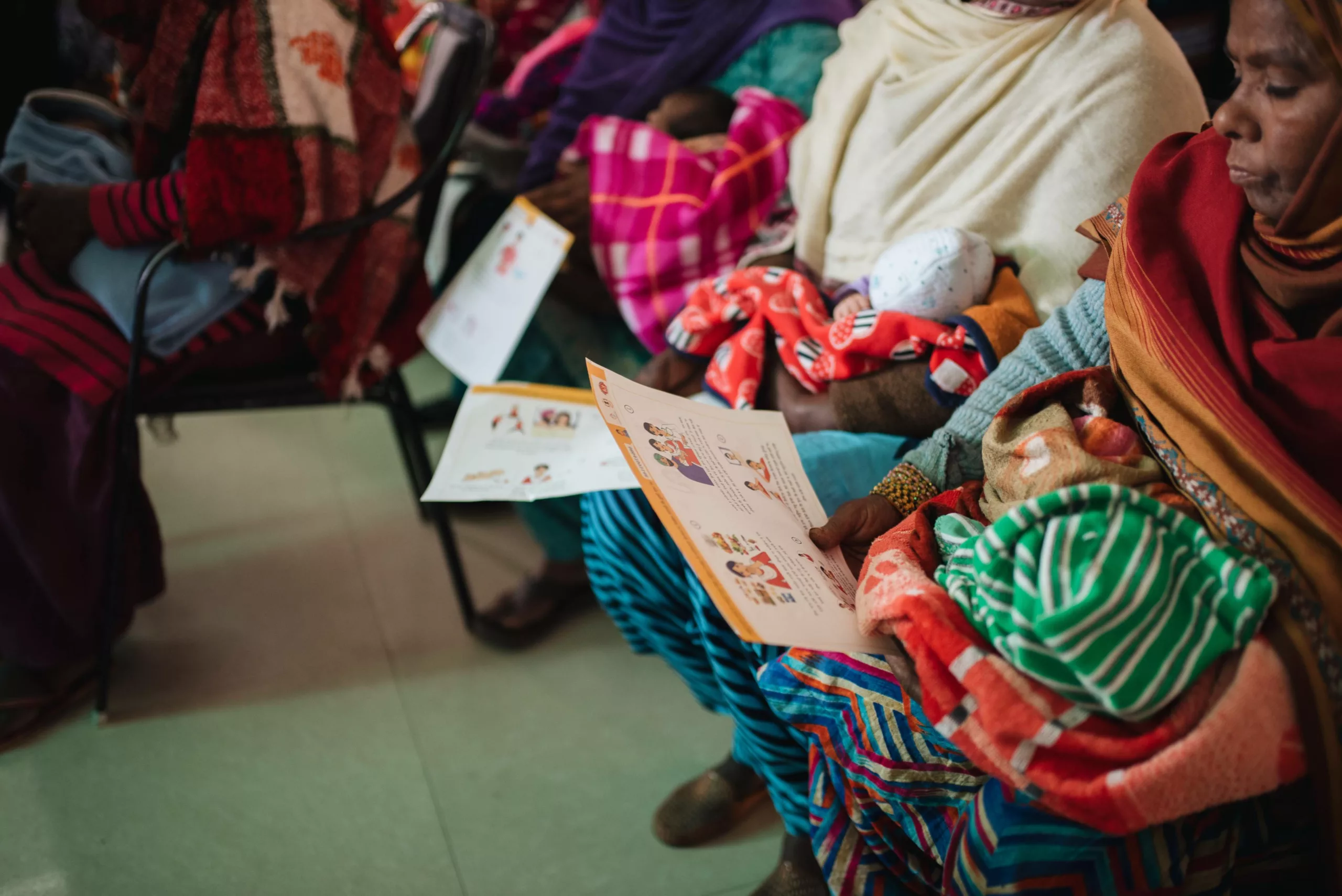
Nurturing caregivers, one relationship at a time
A day in the life of a nurse-turned-data collector, who navigates the hospital and home with equal ease.
My name is Vijay Luxmi, but everyone affectionately calls me Lakshu. I’m originally from Pathankot, a district in northern Punjab. Currently, I live in Mukerian, a town in Hoshiarpur district, with my husband and two sons.
Around five years ago, I started working as a data collector for an impact evaluation of Noora Health’s postnatal Care Companion Program (CCP). I never planned to get into this line of work; it was a bit of a happy coincidence. I’m actually a nurse by training and got married while I was finishing up my studies. After that, I got a nursing job at a hospital in Jalandhar, which is about 80 kilometers away from where I live. This became a bit of an issue for my in-laws and husband as I had night shifts and often had to stay overnight in Jalandhar. So, I decided to quit and start preparing for a government job’s entrance exams.
It was then that I found out about Noora Health from an ex-nursing school classmate who worked here. The work seemed interesting and felt like a good fit given my background as a nurse. I applied, got the job, and started working as a data collector. A year in, all our research work came to a stop during the pandemic. So I switched to working as a tele-trainer, calling patients who had Covid-19 and their caregivers, and providing them with all the necessary information — how to wash their hands, wear masks, what symptoms to look out for, and what to do in case they or someone around them got infected.
As our Covid-19 tele-training program came to an end, I resumed my duties as a data collector. As part of it, I now have the dual responsibility of gathering data for research projects and supporting the program delivery team by going to hospitals to observe caregiver training sessions. We recently wrapped up data collection for a study, so my focus these days is on program monitoring.
5 am: My older son is seven and the younger one is only one-and-a-half, so I wake up early to get everything ready for them. I pack a lunch box for the elder one, make him study for a bit, and get him ready for school. For the small baby, I need to prepare all his different feeds for the day before dropping him off with my in-laws, who babysit him. I’m grateful to have their support, as my husband works in the army and is away from home for 4–6 months at a stretch.
8.15 am: I set-off for my hospital visit. As a data collector, I’m currently responsible for monitoring Noora Health’s health education sessions being conducted in four hospitals — Hoshiarpur, Dasuya, Mukerian, and Pathankot. Hoshiarpur is the furthest away from me and it takes about 1.5–2 hours to get there by public transport. Pathankot is also similar, but Dasuya is close by. Typically, I do three visits in a week, one every alternate day. As a mother with two young children, I appreciate this flexible schedule as it allows me to take care of them along with other household tasks.
9 am: Today, I’m going to the Sub Divisional Hospital in Dasuya. Upon reaching, the first thing I do is go take a round of the wards to greet everyone — the nurses, supervisors, and the matron. This is a really important part of my day. Not only does it help me build my relationship with the hospital staff, but is also a subtle way of signaling that they need to call me to observe their CCP sessions. It also gives me a sense of what’s happening in the wards. When I see that the nurse on duty is really busy, I understand why it might not be possible for her to do a session that morning.
The hospital staff has always treated me very well. I’m very extroverted, so I quickly become friends with everyone. Sometimes, if I haven’t gone to the hospital for a week, they message me saying, “Ma’am, you haven’t come in some time. What happened? We get motivated when you come. It feels good to have someone give us feedback, so keep coming.” It really inspires me to hear this from them.
This is not to say that it’s all smooth sailing. There have been instances where individual nurses have refused to conduct CCP sessions. Once, after a nurse was onboarded, she told me that she won’t be able to conduct sessions since she was only in the hospital for a month, on substitute duty from elsewhere. Luckily, this is the exception, not the norm. Naturally, sometimes nurses are too busy to conduct sessions, but part of my work in the hospital is to listen to their concerns and find solutions together.
11 am: After the doctors have finished their rounds, and the nurses have wrapped up their morning duties, like giving patients medicines, the sessions start. Sometimes I have to wait around till they call me to observe the sessions, but that’s ok.
I adjust to the nurses’ schedules, not the other way around. That’s why I always go a bit earlier, keeping them in mind.
The first CCP session today is in the maternity ward on postnatal care, as part of which we cover cord care, the importance of exclusive breastfeeding, immunization, and healthy dietary practices for the mother, among other things. The nurse gathers all the mothers and family members present in the ward – grandparents, fathers, aunts, and uncles — telling them that she’s going to give them some important information. Often, this catches the attention of people passing by, who are intrigued to see what’s going on and come join in.
Once everyone has settled down, the session starts. Using Noora Health’s flip chart and a doll, the nurse clearly explains how mothers need to hold their baby while breastfeeding. She shares how the incorrect position causes milk to enter the baby’s airway, leading to aspiration and even death. Since she has started explaining this topic, the nurse says that such cases have come down in the hospital, and so she urges all parents to make an important note of it.
In my diary, I note down the total number of participants attending the session, be it mothers or caregivers. No detail escapes me — I notice whether the nurse is loud enough to be heard across the room, if she’s using all the materials provided correctly, whether she’s covering all the topics, and how engaged the participants are. Using these notes, I write up a weekly report to share with my supervisors. These reports are then used to share feedback with the nurses on what they’re doing well and where they can improve.
A lot of questions are being asked today and it’s good to see that people are motivated. Doctors are often too busy to share all the necessary health information, and nurses usually don’t have the time to sit and explain things individually. So when we explain all of this in a gathering, the caregivers learn better. The patient may not retain that much because of the pain they are in, but their caregiver is always there, taking notes and paying attention.
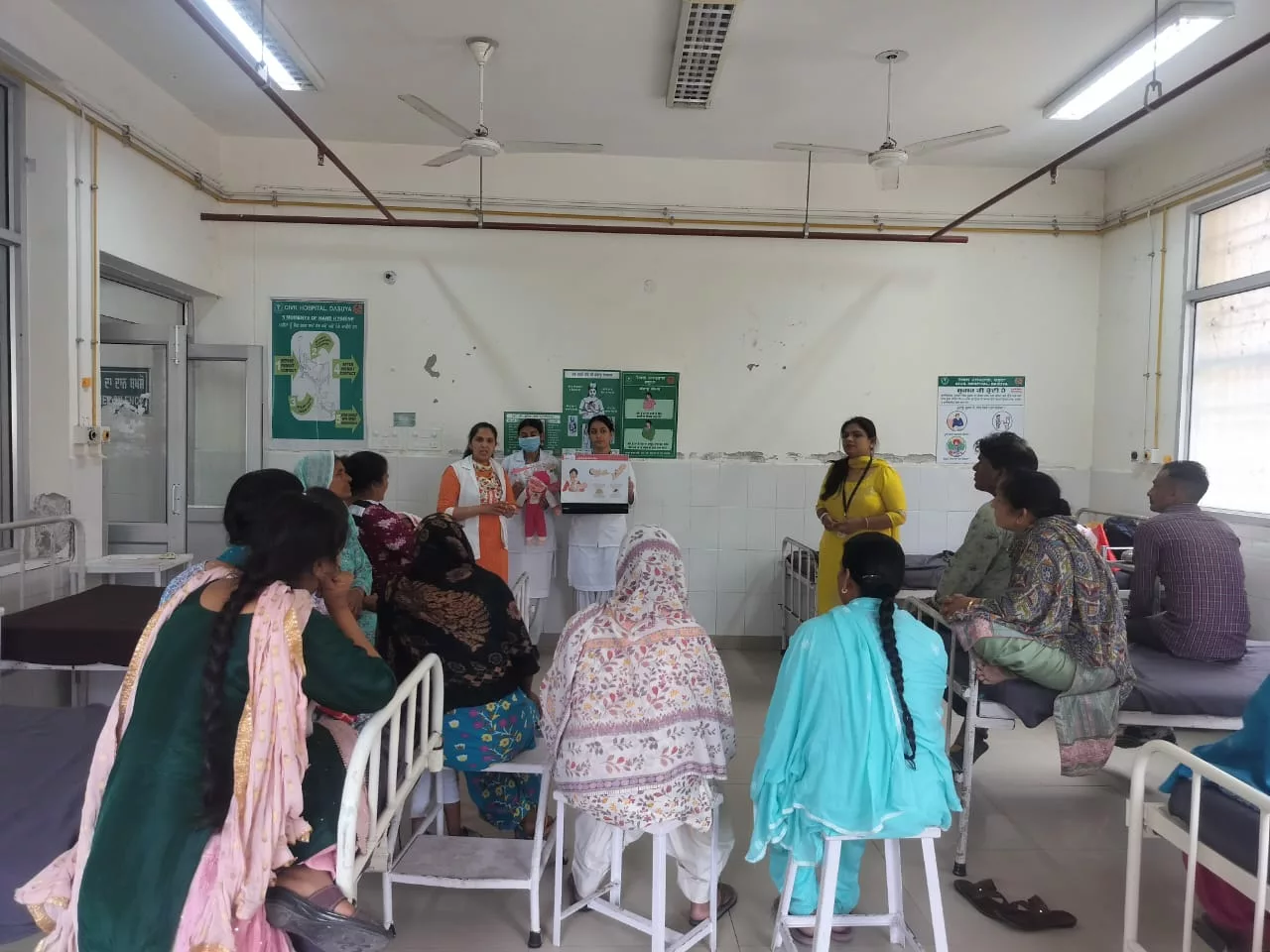
11.25 am: At the end of the session, during the question and answer part, the nurse has to rush off to respond to an emergency case that just came in. This sometimes happens as nurses’ schedules are unpredictable, but they always make sure to answer any pending questions later on.
A big part of Noora Health’s CCP is a two-way, phone-based service, which sends reminders to patients and families about the information they’ve already learnt, and gives them a space to ask questions. Before the patients disperse, I step in to make sure that everyone has taken the number to sign-up for the service. I remind them, “Have you written the number? Did you get all the information you need? The number is completely free of cost, you get a lot of good information, so make sure you use it.”
I’m able to recommend the CCP with full confidence because I myself used it and benefited from it during my pregnancy journey.
When my first son was born, I was pretty young and didn’t know many things, despite being a nurse. My second child was born after I joined Noora Health, so everything that we teach in the hospitals, I implemented with him. For instance, I didn’t pay attention to my diet at all during my first pregnancy, but the second time I made sure to follow a balanced diet, eating green vegetables, lentils, and yogurt. Or, when everyone around me told me that it was auspicious to feed the newborn baby something sweet, I was able to put my foot down and say that I would listen to the doctors and only breastfeed him for the first six months.
12.15 pm: Another nurse calls me to observe her session in the surgical ward for our non-communicable diseases, general medical, and surgical care program. When I first started coming to this hospital, caregiver training sessions only happened in the maternity ward. Since then, 8-9 more nurses have been trained, so sessions now happen in other wards, such as the general medicine, surgical, labor, dialysis, and orthopedic wards.
Today all the sessions are happening on time, one after another, but things don’t always go so smoothly. Last week in Dasuya, for example, no sessions happened. When I asked the head of the maternity ward why this was the case, she looked at me helplessly and said, “There were a lot of deliveries last week and there was a shortage of staff since many were on leave. There’s only so much I can do alone. I wanted to do it, but had no time.” In moments like these, I do feel a bit demotivated, because I see that they’re doing everything they can, and I’m doing everything I can, but situations like these are out of our control.
12.45 pm: I observe a few more sessions and put down my notes on what the nurses are doing well and how they can improve — be it making better use of the tools provided or connecting different topics to each other. It’s important for me to document everything correctly as I later have to share this feedback with the program team.

3 pm: By the time my older son comes home from school, I’m back from work. We have a quick lunch together and I sit down for my meeting. Every Friday, we have an online meeting of all the field data collectors and the program associates in Punjab. This is a chance for all of us to share our observations, learnings, and challenges with the rest of the team.
In the call, we also take stock of what training materials are needed in which hospital. Every hospital I visit, I check how many take-home pamphlets are needed, and keep track of who is regularly asking for more and who has a lot left. This is another way for us to understand how the program is actually running.
4 pm: It’s been a long day, so I spend about an hour unwinding and playing with my sons. After that I send my older son off for his evening classes, use my notes to write up my report for my supervisor, and start preparing the evening meal.
9 pm: It’s often hard taking care of two children alone while also managing work. But I like keeping myself busy — it helps me sleep well at night, knowing that my work is having a good impact on the world around me. I felt that way when I was a nurse too, but nurses carry a lot of mental load. We don’t get appreciated as much for what we do and there’s so much uncertainty about our duties. That used to make me a bit sad.
The good thing now is that I don’t feel like I’m doing something very different from what I studied. Many skills I learnt as a nurse — giving health talks, going from bed to bed, building a rapport with patients — all come in handy. I’ve noticed a big improvement in my personality and skills since starting this job. When you leave the house and go out, especially as a woman, you encounter all sorts of things and people in the world. So you get to learn a lot about how to deal with situations, where to go, what to do. This has made me more confident, and even my family has noticed and complimented me on this growth!
Every time I visit a hospital, I am reminded that there are so many more diseases and illnesses where people need the right information and knowledge. My hope is that Noora Health keeps working on this, and that I keep learning, growing, and doing good work.
